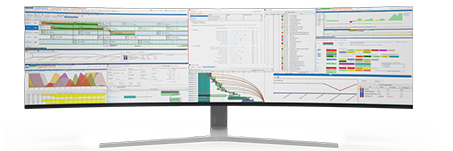Real-Time Predictive Analytics for Scheduling Disruptions
Plant managers constantly strive to optimize production schedules to meet demand, minimize costs, and ensure product quality. However, disruptions are inevitable in this complex environment, ranging from machine breakdowns to supply chain delays. These disruptions can wreak havoc on production schedules, leading to inefficiencies, increased costs, and customer dissatisfaction.
Fortunately, advancements in technology have opened up new possibilities for managing scheduling disruptions more effectively. Real-time predictive analytics, coupled with advanced scheduling software like PlanetTogether, offer plant managers powerful tools to anticipate and mitigate disruptions before they occur.
In this blog, we'll explore how the integration of PlanetTogether with leading enterprise resource planning (ERP) systems such as SAP, Oracle, Microsoft, Kinaxis, and Aveva can revolutionize scheduling in food and beverages manufacturing facilities.

Understanding the Challenge
Before looking into solutions, let's first understand the challenges plant managers face when it comes to scheduling disruptions. Traditional scheduling methods often rely on historical data and static schedules, making them ill-equipped to handle real-time changes. Moreover, the interconnected nature of modern manufacturing operations means that disruptions in one area can have ripple effects throughout the entire production process.
For instance, a delay in raw material delivery can impact the production line's ability to meet its output targets, leading to bottlenecks and idle machinery. Similarly, unexpected equipment failures can halt production altogether, resulting in missed deadlines and wasted resources. In such scenarios, plant managers must scramble to reorganize schedules on the fly, often resorting to manual adjustments that are time-consuming and prone to errors.

The Role of Predictive Analytics
This is where predictive analytics comes into play. By leveraging historical data, machine learning algorithms, and real-time sensor data, predictive analytics can forecast potential disruptions with remarkable accuracy. Whether it's predicting equipment failures based on maintenance records or anticipating supply chain bottlenecks through analysis of vendor performance, predictive analytics empowers plant managers to proactively address issues before they escalate.
When integrated with advanced scheduling software like PlanetTogether, predictive analytics can inform dynamic scheduling decisions in real-time. Instead of relying on static schedules, which quickly become obsolete in the face of disruptions, plant managers can adjust production plans on the fly based on predictive insights. This agility not only minimizes the impact of disruptions but also maximizes resource utilization and throughput.


Integration Between PlanetTogether and Leading ERP Systems
Now, let's discuss the integration between PlanetTogether and leading ERP systems such as SAP, Oracle, Microsoft, Kinaxis, and Aveva. ERP systems serve as the backbone of modern manufacturing operations, centralizing data and streamlining processes across departments. By integrating scheduling software like PlanetTogether with ERP systems, plant managers can achieve seamless data exchange and synchronization, enabling real-time decision-making at every level of the organization.
For example, imagine a scenario where a sudden surge in demand requires additional production shifts to meet customer orders. With integrated scheduling and ERP systems, plant managers can quickly assess the availability of manpower, raw materials, and equipment, and adjust schedules accordingly. Moreover, by syncing with inventory management modules, scheduling software can ensure that production plans align with available inventory levels, preventing overstocking or stockouts.
Integration with ERP systems enables cross-functional visibility, allowing stakeholders across departments to access real-time scheduling information. This promotes collaboration and alignment towards common goals, fostering a culture of agility and responsiveness within the organization.
Real-time predictive analytics coupled with advanced scheduling software offer a game-changing solution for managing scheduling disruptions in food and beverages manufacturing facilities. By leveraging historical data and predictive insights, plant managers can anticipate and mitigate disruptions before they occur, minimizing downtime and maximizing efficiency.
Integrating PlanetTogether with leading ERP systems like SAP, Oracle, Microsoft, Kinaxis, and Aveva enables seamless data exchange and cross-functional visibility, empowering organizations to make informed decisions in real-time. As the industry continues to evolve, embracing predictive analytics and integrated scheduling solutions will be essential for staying competitive in the dynamic landscape of food and beverages manufacturing.
Are you ready to take your manufacturing operations to the next level? Contact us today to learn more about how PlanetTogether can help you achieve your goals and drive success in your industry.























LEAVE A COMMENT